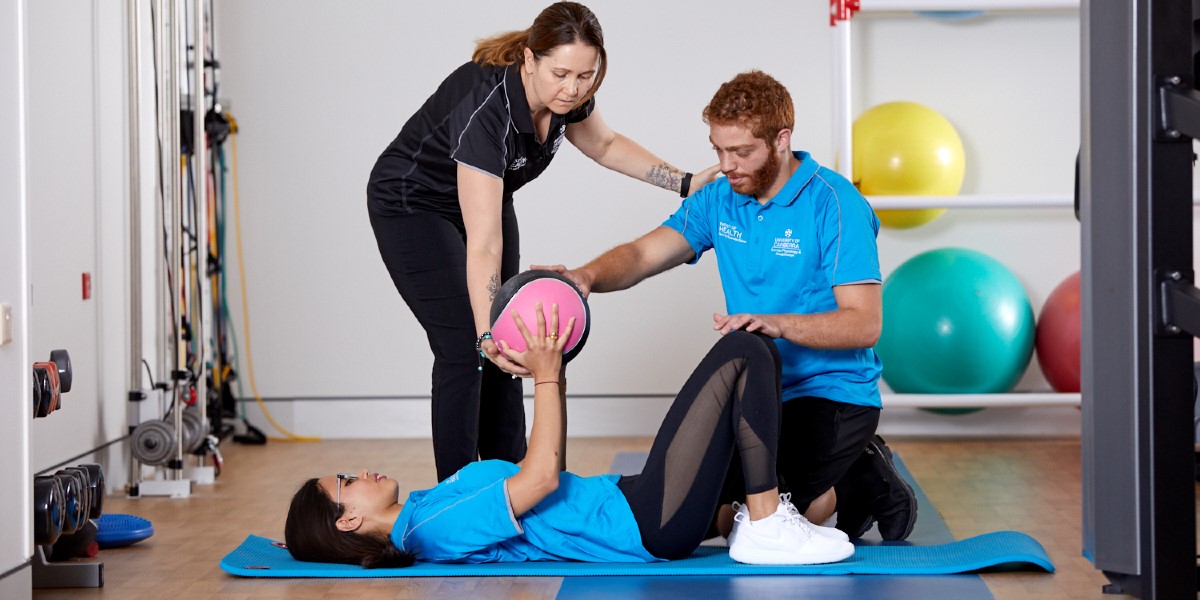Sport and Exercise Science

Sport and Exercise Scientist explores the complexity of human movement and strategies to aid athletes in reaching their full potential.
Study exercise physiology and rehabilitation to help those who are injured or physically impaired get their lives back on track. Study sports analytics to analyse and interpret sporting data and communicate your findings to a range of audiences. Study human movement to teach the role and benefits of exercise and physical activity to the broader community, and much more.
Careers
Studying sport and exercise science opens a wide range of career paths.
- Exercise physiologist
- Sport development officer
- Sports analyst
- Performance analyst
- Physical training specialist
- Fitness instructor
- Outdoor educator
- Rehabilitation counsellor
- Sports director
- Team general manager
How to book a workshop
Please email us for enquiries or booking an interactive workshop for your school.
Interactive workshops
| Title | Assessment of physical qualities of sports performance |
|---|---|
| Description | In this session students will participate in a fitness testing battery for a number of physical qualities including power, speed, agility, flexibility and endurance. |
| Learning outcomes |
|
| Session length | 90 minutes |
| Class size | 15 |
| Location | On-campus |
| Cost | $165 |
| Title | Biomechanical design of a mechanical leg for the human body |
|---|---|
| Description | In this session students will use movement of their own bodies to explore the function of various joints in the human body. Using the hip and knee joints students will be given a design challenge whereby they will be given a range of materials and tasked to build a prototype mechanical leg that includes a hip and knee joint. Students will test the functionality of their prototype against criteria. Working together, groups can create a list of re-design options to improve their and be given the opportunity to re-design and reflect on their prototype. |
| Learning outcomes |
|
| Session length | 90 minutes |
| Class size | 20 |
| Location | On-campus |
| Cost | Free |
| Title | Biomechanical principles of sport |
|---|---|
| Description | In this session students will complete several practical activities to examine fundamental biomechanical theories as they apply to sport and exercise. This session can be tailored to meet particular needs depending on the focus of classroom learning. |
| Learning outcomes | The biomechanics session can cover the following concepts:
|
| Session length | 90 minutes |
| Class size | 15 |
| Location | On-campus |
| Cost | $165 |
| Title | Inside the Mind of an Athlete |
|---|---|
| Description | This interactive workshop explores the psychological demands placed on the elite athletes, and the ways that such demands can be overcome. Further, the session highlights strategies deployed on the road to becoming an elite athlete, and transferrable learnings that can be applied in our daily lives. |
| Learning outcomes |
|
| Session length | 90 - 120 minutes |
| Class size | 20 |
| Location | On-campus or off-campus |
| Cost | Free |
| Title | Physiology of sport and exercise |
|---|---|
| Description | In this session students will observe and assist in a laboratory assessment of the acute physiological response to exercise. A student from the class will complete a graded exercise test to demonstrate measurement of VO2-max, blood lactate and other cardio-respiratory variables. |
| Learning outcomes |
|
| Session length | 90 minutes |
| Class size | 15 |
| Location | On-campus |
| Cost | $165 |
| Title | The Human Skeleton – Putting it all together |
|---|---|
| Description | This session will allow students to have hands-on experience with real human anatomical specimens. Students will work in small groups to assemble a human skeleton. During the session, they will learn the terminology used to describe anatomical locations and directional terms, as well as identify the major bones that comprise the human skeleton. |
| Learning outcomes |
|
| Session length | 45 minutes |
| Class size | 20 - 30 |
| Location | On-campus |
| Cost | Free |
| Title | Group Fitness Session |
|---|---|
| Description | Group fitness training sessions run by 3rd year Exercise Physiology students including:
|
| Learning outcomes |
|
| Session length | 60 minutes |
| Class size | max. 26 |
| Location | On-campus |
| Cost | $80 |

